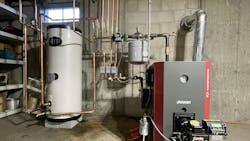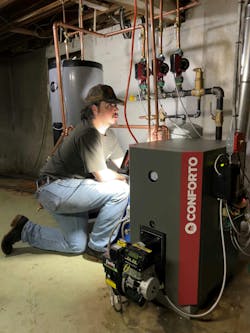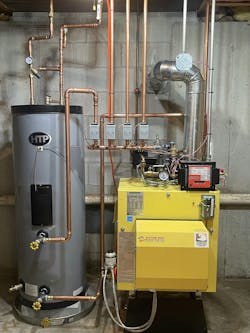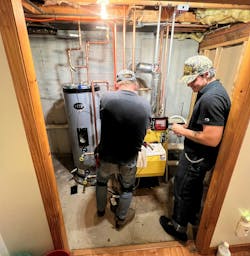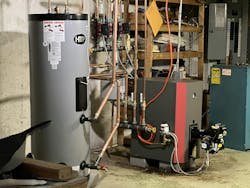Preventing Water Heater Disasters: Signs, Maintenance, and Modern Solutions
Key Highlights
- Water heaters often show signs of trouble through moisture, noises, and inconsistent hot water
- Corrosion, sediment buildup, and water quality significantly impact the lifespan and performance of water heaters
- Modern units like the HTP SuperStor Ultra offer benefits such as extended warranties, high efficiency, corrosion resistance, and easier maintenance
Every automobile owner knows that when the check engine light pops on, the vehicle requires swift attention. Water heaters lack such obvious alerts, but careful monitoring can help avoid a cataclysmic disaster.
An unfortunate homeowner in Massachusetts found out the hard way that inattention to a water heater’s distress signals can prove disastrous. Noah Powers outlined how his team at Powers Energy Corporation replaced the water heater in a 77-year-old home with an HTP SuperStor unit after the 15-year-old existing unit sprang a leak in the home’s basement.
Powers Energy is a full-service, family-owned company that provides complete installation and repair of all types of heating and air conditioning equipment. The company has been in business almost 30 years.
“They had a good mess,’’ Powers said. “It’s not super common to see a full blowout, but we do see it every once in a while. Once the leak got going, it really let loose.”
Water heaters might not have the warning lights that have become standard on vehicles, but attentive homeowners can detect potential problems with various means of monitoring.
Signs of Trouble
The most apparent signal that could indicate a problem with the water heater is moisture around the base of the tank. Water heaters can last up to 20 years, but the typical lifespan is around 8-15 years. Maintenance, water quality and usage can all contribute to the lifespan of a water heater.
Water surrounding the tank, however, does not always mean the heater is starting to fail. Loose connections, excessive water pressure or a faulty drain valve could be causing water to collect. Water quality can also lead to premature breakdown of the water heater and components. Hard water can lead to corrosion, which will eventually result in replacement.
“The water in this area is a bit hard, and there was corrosion within the tank,’’ Powers explained.
Anode rods within the tank help extend the lifespan of water heaters by attracting corrosive elements in the water, but they also require replacement. “Most manufacturers recommend changing them periodically, depending on the water quality,’’ Powers said. “We work in rural areas where water is not as hard, and anode rods can be replaced every couple of years. It’s inexpensive to replace, so it’s a no-brainer to replace them and extend the lifespan of the tank.”
Warning signs can also be found with visible and thermal clues. Inconsistent water temperature or insufficient hot water are both indicative of problems with the water heater. Rusty or reddish water is also a sign that the water heater might be starting to fail. Corrosion within the water heater can cause rust. Sediment that accumulates in the water heater can also become dislodged and cause temporary discoloration.
Loud noises stemming from the tank should also alert homeowners to a potential problem. Banging or rumbling are common noises and can be attributed to excess sediment. Crackling sounds in electric units can indicate an obstruction that might require a technician to drain the tank.
Uncommon Failure
While Powers sees water heater failures, the spontaneity and scope of the failure on this particular unit surprised him.
The home, a three-bedroom, two-bath Cape Cod style house, includes slightly more than 1,900 square feet and was built in 1948. It has seen its share of water heaters during its 77-year existence. “There are a couple of teenagers in the house, but the hot water needs are not as much as a family with young kids,’’ Powers said.
Powers suspected the water heater had been showing signs of failure, but the homeowners were unaware a problem was developing.
“It wasn’t a gradual buildup within the water heater,’’ Powers said. “The bottom of the tank got pretty nasty with corrosion buildup.”
Powers selected the HTP SuperStor Ultra SSU-45N indirect water heater for the replacement, and it works well with an Energy Kinetics System 2000 boiler. “It’s a perfect pairing and it’s something we use for a lot of our jobs,’’ Powers explained. “The boiler is fast to ramp up, and it’s perfect for minimizing the amount of heating oil a family will need. In terms of longevity and meeting hot water demand, it’s a great combination.”
Exceptional Warranty
One of the important benefits of the HTP SuperStor indirect water heater is the limited lifetime warranty of the appliance.
“When customers are looking at the warranty, it gives them peace of mind to know that they have that warranty,’’ Powers said. “They realize that no part is perfect. But having a company that stands behind their product and gives the customer that peace of mind is a big advantage.”
The HTP SuperStor Ultra can generate 50 percent more hot water than many competitors. It also offers minimal heat loss with two inches of blown foam insulation.
Powers has been using HTP units almost exclusively for five years. “The finishing is better, it’s a sleeker design and if it looks good, it’s probably going to operate well. There’s no anode rod, so you don’t have to nudge the customer to replace it. It makes for easy maintenance for them, and for us.”
Customer Education
Powers said it’s important for homeowners to frequently monitor their water heaters for leaks, noises and inconsistent hot water. Complete failures, such as the one that occurred in this instance, are uncommon and can be averted with maintenance and monitoring.
“If the homeowner maintains the system, they can expect the water heater to last a long time,’’ Powers stated. “We worked on a home that had an HTP from 1992 that only started to leak after 30 years. It didn’t owe the homeowner anything. If you stay on top of boiler maintenance and regularly flush the HTP to make sure there is no buildup, you’re not likely to have any problems.”
